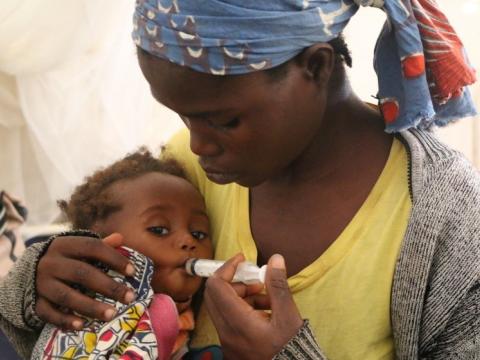Child Deaths from Malaria increase in Huambo, Angola

In the face of increasing malaria cases, World Vision Angola is seeking resources from partners and donors to support the Angolan government in reducing malaria in the province of Huambo.
The malaria endemic Huambo province, located in the central highlands of Angola, has an estimated population of over 2 million people. In the first quarter of 2017, the province registered 51,260 malaria cases and 385 deaths compared to 12,207 cases and 6 deaths for the same period in 2013.
The country’s health sector has been negatively impacted by Angola’s current economic crisis, with most health facilities running low on basic supplies including medicines, due to budget cuts.
Angola’s economic crisis stems from the slump in global crude oil prices as oil accounts for 45 percent of the country’s GDP and 95 percent of its imports.
Experts also attribute the rise in malaria cases largely to the end of a malaria pre-elimination intervention programme entered into in 2013 between the government and eight NGOs.
Given this crisis, which has largely impacted the health sector, the Huambo Provincial Department of Health has launched a three-pronged emergency appeal to reduce malaria cases. The appeal is for US$300 000.
Firstly, health authorities are seeking assistance with preventive measures, which are the major factors in reducing Malaria cases. Help sought includes raising awareness in communities on the causes, effects and timely search for specialized medical services.
Secondly, the appeal seeks to ensure refresher training for medical personnel from health post to hospital level, to update them on the current National Malaria Treatment Protocols.
Lastly, an emergency supply of anti-Malarial drugs and hospital supplies is urgently needed as stated in an appeal from the Provincial Health Director, Dr. Carlos Pedro.
Catchiungo Municipality, located about 69 km east of Huambo city, has many malaria cases according to Dr. Carlos, who is also the Director of the Municipal Hospital of Catchiungo.
He says, most patients reach hospitals with malaria already in an advanced stage.
Most of the families interviewed about their late search for medical services cite the unavailability of transport, lack of trust in their village health posts where there is usually no testing, and the shortage of anti-malaria drugs.
It has been noted that many families only seek medical services when one or two of their children have succumbed to malaria.
In one instance, the Catchiungo hospital registered 25 child deaths within a period of just 12 hours of admission.. The late search for medical services has largely been blamed for this.
Since September 2016 when Dr. Carlos took over management of the hospital, more than 3,000 malaria cases have been registered.
Nurses at the hospital say there is need to educate people to seek early treatment rather than turn to traditional healers.
The Catchiungo Municipal Hospital is one of three hospitals in Huambo that benefited from the emergency project implemented by World Vision last year. According to the hospital records the intervention impacted more than 2,651 people.
"The donation came at the right time as it was during the peak of the Malaria season and the hospital had no other means to respond to the health situation affecting the community," says Dr Carlos.
Currently the hospital is facing a critical shortage of essential medicines and other resources. As a stop-gap measure, the hospital is campaigning with churches, scout groups and traditional leaders to sensitize communities on the importance of health care, especially Malaria prevention.